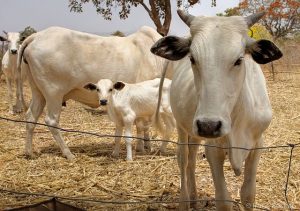
Lagosians eat an estimated N328 billion worth of cow meat per annum.
About 98 per cent of cattle consumed in Lagos State are from the northern part of the country or from across the border.
The remaining two per cent is a shortfall in local production and represents about 181,757 tons of meat or about 1,235,601 heads of cattle per annum.
These were made known on Monday in Lagos by the Permanent Secretary in the state’s Ministry of Agriculture, Mrs Ibironke Emokpae.
She represented the commissioner, Ms Abisola Olusanya, at a cattle feedlot screening for 36 investors.
She noted that the feedlot screening was necessary because the transactional value of cattle traded in Lagos State was huge.
She added that when the red meat transformation agenda comes fully into play it would help the state government to eliminate logistics costs of transporting cattle.
Emokpae emphasised also that the cattle feedlots initiative would bridge the demand and supply gap and prevent food crises in the state.
The feedlot represents an intensive production system with the goal of growing and fattening cattle until they reach slaughter weight.
“The partnership with private investors will prevent food crisis associated with ethno-religious crisis, cattle rustling, and zoonotic diseases and encourage animal traceability.
“The state embarked on the Cattle Feedlot Systems partnership to evolve a model that will bring in investors who are fully ready technically, administratively and financially to kick-start the project.
“I should bring to your remembrance that Governor Babajide Sanwo-Olu’s administration, which is keen in making our agricultural sector viable and sustainable, decided to change the face of agriculture and food system in the state.
“The governor made this possible through the Ministry of Agriculture’s five-year roadmap where he established linkages, collaborations and strategic partnership with organisations,’’ she said.
Emokpae said government remained focused on enforcing a market structure that ensured a transformation in food systems.
It therefore, invited interested investors through media advertisements to bid for the feedlots, she said, adding that the state received more than 150 Expressions of Interest as against the 100 it proposed.
In his remarks, Mr Ayokunle Omileye, the Project Manager in the ministry noted that the state had acquired about 750 hectares of land for the project.
He noted that the exercise would take place at the three senatorial zones of Badagry, Ikorodu and Epe.
He added that the state government had cleared about 250 hectares of land for the first phase and would provide road networks, electricity and water supply for investors in the project.
One of the investors, Mr Olawale Talabi noted that the project was long overdue adding that it would bring an end to food crisis in the state.
“I think the ministry has just got it right with the new commissioner because feedlot is very important,
“This will ensure that the cattle are well taken care of, and consumers are sure of the source of meat they eat.
“In addition, we cannot be rearing animals all over the place, but with the feedlot system, just like ranching, there will be quality of meat in Lagos State,’’ he said.
Talabi said the project would also bring an end to infiltration by diseased cattle coming from neighbouring countries.
The theme of the exercise is: “Five Years Agriculture Roadmap: Cattle Feedlot System Partnership with Investors in Lagos State.’’









